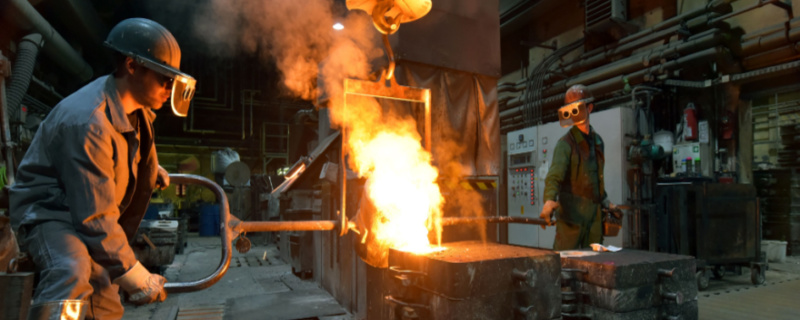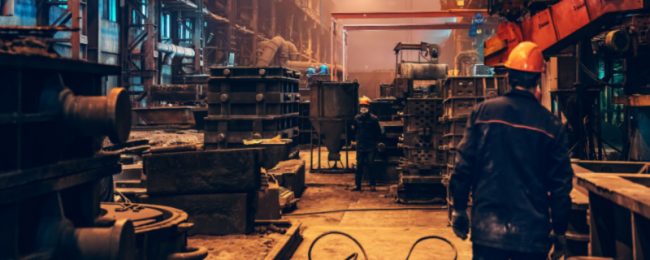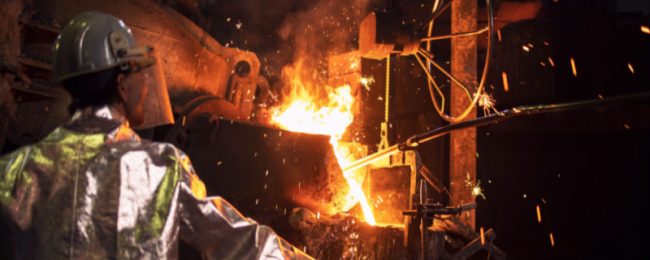Top 10 Casting Safety Considerations for Foundries

Foundry safety must be top of mind for all facilities that perform metal casting. There are many health and safety issues to be aware of when casting.
The most apparent casting safety concern is burning. Employees are working with molten metals that are extremely hot. If an employee comes into contact with the material or equipment, they will be severely injured.
However, burns are not the only casting health and safety concerns. Foundry safety programs should also address dust inhalation, heat stress, and vision protection.
To assist, the PumpWorks Castings team has compiled this list of safety precautions in foundry and casting facilities. These ten recommendations can improve foundry safety and protect the company from liability.
When exploring ways to improve casting safety, we suggest that organizations:
1. Complete a Thorough Hazard Assessment
A thorough hazard assessment will help identify all health and safety issues when casting. While virtually all foundries encounter some of the same casting safety issues, each operation is unique. Therefore, this assessment helps a facility determine which concerns pose the most considerable risk to their organization.
2. Have Workers Wear Proper Safety Equipment and Clothing
The dangers of many health and safety issues when casting can be mitigated by wearing proper safety equipment during work hours. The right clothing and equipment can reduce an employee’s risk of being burnt, inhaling dust, or incurring eye damage.
3. Comply with Environmental Regulations
Discussions about safety precautions in foundry and investment casting facilities often center around employee health and wellness. While keeping employees safe should always be a top priority, it is equally important to comply with environmental regulations.
Foundries have a responsibility to be good stewards of environmental resources. Therefore, complying with relevant regulations will minimize the foundry’s impact on the environment while reducing the risk of incurring hefty civil penalties.

4. Be Mindful of Heat Stress
A high-heat environment like that of a foundry can take its toll on employees. Other than burns, the biggest heat-related risks to employees are heat stress, heat exhaustion, and heat stroke.
Employees should be trained to recognize the signs of heat stress so that they can look out for one another, notify management, and provide basic first aid.
5. Keep Moisture Out
When moisture enters a foundry, it can create explosive bursts of steam that scald employees. Therefore, facility managers must make every effort to minimize moisture on the foundry floor. This minimization can be accomplished by warming metal ingots before melting them and storing sand in moisture-tight areas.
6. Inspect Machinery Before Use
All equipment should be thoroughly inspected before it is used. This inspection will ensure that the equipment is functioning correctly and free from damage.
Inspecting machinery also allows facility managers to detect potential issues sooner. In turn, this will extend the lifespan of equipment, prevent casting defects, and reduce the likelihood of encountering unexpected production delays.
7. Provide Ongoing Training
Over time, employees can become complacent regarding health and safety issues when casting. Fortunately, employers can reduce this complacency by providing staff with regular training. At a minimum, employers should provide safety training annually.

8. Prevent and Minimize Harmful Vibration
Investing in equipment that produces minimal vibration can significantly improve safety in several ways.
First, reducing vibration minimizes equipment damage, which leads to a lower risk of catastrophic machinery failure. Less vibration also improves employee communication, leading us to our next casting safety consideration — noise.
9. Monitor Noise Levels
High noise levels in an industrial casting foundry setting create a multitude of health and safety issues when casting. Excessive noise can damage employees’ hearing. Additionally, excessive noise pollution makes it difficult for employees to communicate. They will not be able to collaborate as effectively and might find it hard to warn one another of hazards.
Therefore, facility managers should monitor noise levels within the foundry. In addition, whenever possible, they should invest in noise-dampening equipment, as doing so will improve safety and make it easier for employees to communicate.
10. Reduce the Risk of Dust Exposure
Dust inhalation poses several health risks to employees. Foundries can mitigate these risks by proactively reducing the dust produced and installing quality ventilation equipment. Employees should also be provided with personal protective equipment (PPE) like respirators.
Cumulatively, these tactics will help foundries address many health and safety issues when casting.
PumpWorks Castings Promotes Foundry Safety
PumpWorks Castings offers solutions for the world’s most demanding metal casting applications. Located in Lufkin, Texas, our foundry specializes in sand casting, non-destructive testing methods for casting, lost-wax casting, on-site engineering services, casting design, and 3D printed sand casting.
Contact us today to learn more about casting safety.